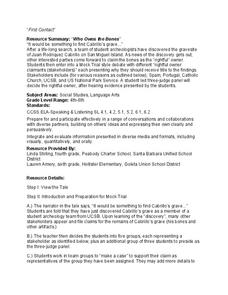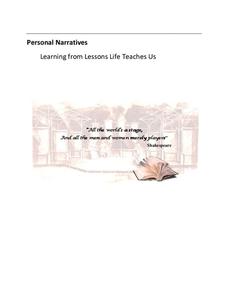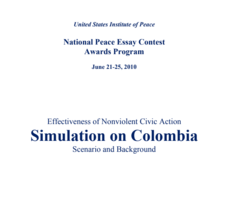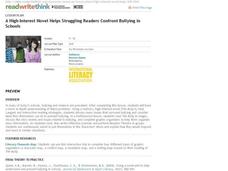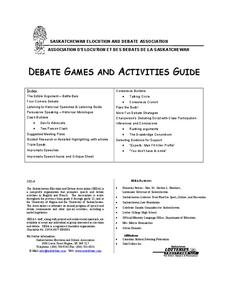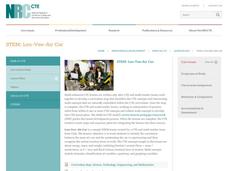Personal Genetics Education Project
Protecting Athletes with Genetic Conditions: Sickle Cell Trait
Should school and professional teams test athletes for sickle cell trait? Will it protect them by providing knowledge or lead to discrimination by not allowing them to participate in sports? After learning about this genetic disorder,...
Lerner Publishing
Teaching Habitats
What makes up a habitat? Use this resource to engage first graders in the exploration of desert, wetland, forest, and ocean habitats. Youngsters classify plants and animals into the four distinct habitats through drawings and cutting and...
Channel Islands Film
Who Owns the Bones
A study of the history of the Channel Islands, located off the coast of southern California, continues as class members conduct a mock trial to determine which group of stakeholders should have the right to claim the remains of Juan...
Channel Islands Film
Step Into the Shoes
Small groups create skits that illustrate the different perspectives of those involved in the transitioning of Santa Rose island from private ownership to National Park.
Thoughtful Education Press
Personal Narratives: Learning from Lessons Life Teaches Us
"First Appearance," Mark Twain's tale about overcoming stage fright, serves as a model of a personal narrative and gets young writers thinking about milestones in their own lives. After examining student models and considering the...
National Nanotechnology Infrastructure Network
Understanding Wave Motion - Slinky vs. Snaky: Which Spring is Dominant?
Ride the wave to an understanding of refraction! The first in a series of two inquiry-based lessons challenges learners to create transverse waves with two different types of springs. As their wave hits an object, they observe the change...
Louisiana Department of Education
Hatchet
Accompany a novel study of Hatchet by Gary Paulson with a unit consisting of 16 lessons focused on physical and emotional survival. Reading the story along with a variety of informational texts, scholars compare and contrast reading...
Georgia Standards
Sociology Unit Six: Socialization Within the Group
How do we learn the rules of society? How do beliefs and ideas affect these rules? Introduce your young sociologists to the factors that socialize individuals with a unit that uses observation and experimentation to analyze how factors...
Teach Engineering
Engineering Brainstorming
Here is a instructional activity that offers a great hybrid of forming new skills and using current knowledge to come up with a plan. The class brainstorms information they would need to know or already know about hybrid vehicles. They...
Portland Public Schools
Teaching Tone to Teenagers
Tone is a tough topic to teach to teenagers. But never, fear, help is here in the form of a unit plan that takes advantage of their interest in music to set the stage for a series of activities that lead them to understand how setting,...
US Institute of Peace
Effectiveness of Nonviolent Civic Action Simulation on Colombia
With new leadership comes new hope! After years of violence, the people of Colombia elect a new president ... could this mean an end to conflict? Civics scholars take part in a large group role-playing exercise designed to illustrate the...
Concordia College Archives
Introduction and Student Inquiry
Introduce young musicians to the history of and different styles of music with an inquiry-based learning activity that asks them to play detectives to determine the similarities and differences among the sheet music found at a series of...
Learning Games Lab
Testing and Adjusting pH
Pupils learn how to control food spoilage by adjusting the food's pH. They see that one of the most dangerous bacteria can grow in food if people don't handle and store food properly. Using knowledge of the bacteria's preferred pH,...
US Department of Homeland Security
Psychological First Aide (PFA) for Students and Teachers
Listen, protect, connect! Using the resource, teachers learn how psychological first aid helps scholars adjust after a crisis or school emergency. They discover how to observe changes in pupils' school performance, listen and offer...
EngageNY
End of Unit Assessment: Fishbowl Discussion
Is it worth it? Scholars complete the end of unit assessment by participating in a fishbowl discussion to consider if the benefits of DDT outweigh the consequences. They reflect on their discussions by completing an exit ticket.
EngageNY
End of Unit Assessment, Part 2: Research and Response
Talk it out. Scholars complete part two of the assessment by participating in a World Café discussion activity. Learners circulate the room, sharing their ideas and thoughts about Canada's natural resources using quotes and paraphrasing...
ReadWriteThink
A High-Interest Novel Helps Struggling Readers Confront Bullying in Schools
Paul Langan's novel The Bully is the core text in a six-session unit plan that engages high schoolers in an in-depth examination of bullying and its effects on bullies, victims, and bystanders. The richly textured and carefully...
Ocean Explorer
Living with the Heat
Young oceanographers study the Submarine Ring of Fire, which is a series of deep-water volcanic vents that come up from the ocean floor. Learners take a close look at the unique ecosystems that are associated with these areas, how these...
Curated OER
Medical Explorer: The Big Idea
Read informational text which relays how medical care differs around the globe and throughout history. There are three separate lessons, each focused on a particular case study, regional medical availability, and cultural norms. Learners...
Saskatchewan Elocution and Debate Association
Debate Games and Activities Guide
A must-have resource for classes that engage in debate, this packet contains 20 detailed plans for debate games and activities. Everything from how to select evidence to support a position, to structuring a debate on which candy bar is...
College Board
AP Physics 1 and 2 Inquiry-Based Lab Investigations
Have you ever wondered what type of AP Physics investigations The College Board wants? This is the guide for you! Sixteen labs covering both Physics I and II will get you started and inspire you to meet the requirement of 25 percent of...
NOAA
Mud is Mud...or is it?
We know that the type of soil varies by location, but does the seafloor sediment also vary, or is it all the same? Scholars compare photos of the seafloor from two different locations: the Savannah Scarp and the Charleston Bump. Through...
National Research Center for Career and Technical Education
STEM: Lou-Vee Air Car
A comprehensive lesson plan on acceleration awaits your physicists and engineers! Two YouTube videos pique their interest, then sample F=ma problems are worked and graphed. The highlight of the lesson plan is the building of a Lou-Vee...
NOAA
Biological Oceanographic Investigations – What's in That Cake?
Have you ever tried to find hidden items in a picture when you don't know what you are looking for or how many things are hidden? A lesson applies that same concept to sampling the deep sea habitats. Participants must first create a...




